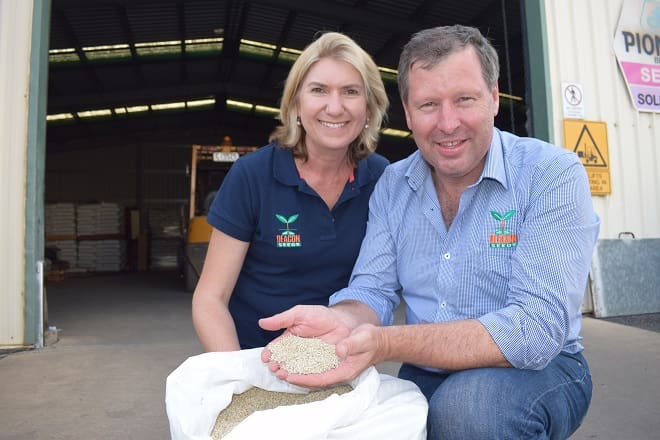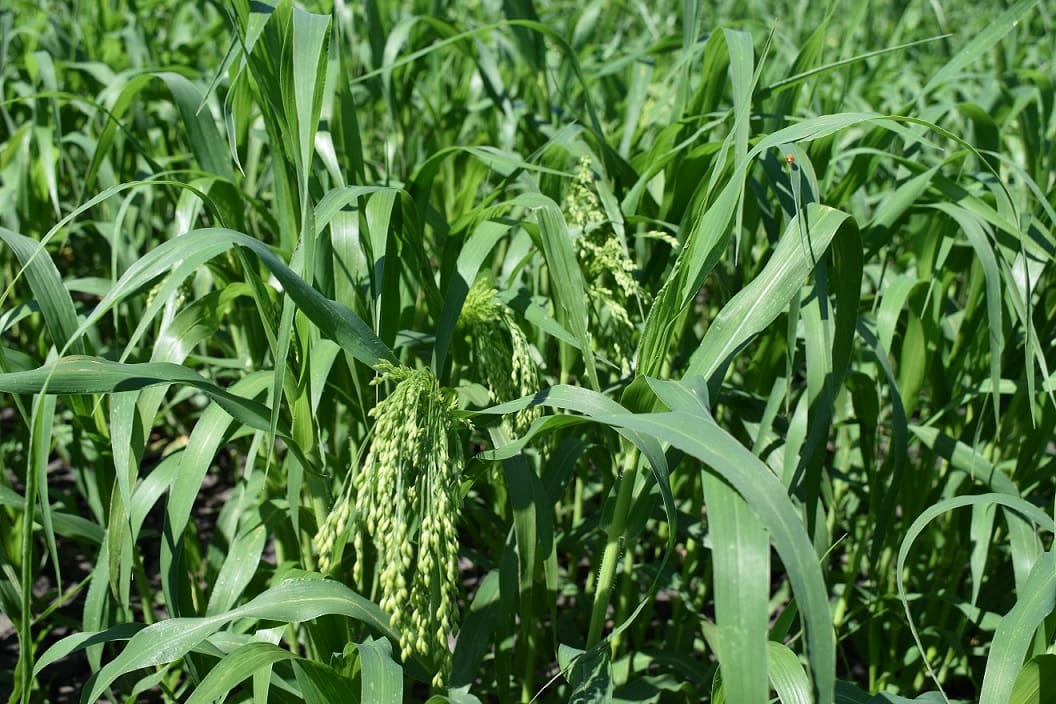
Millet is one of the commodities handled by Karen and Mark Schmidt at Deacon Seeds, Dalby. File photo: Neil Lyon
THE DOMESTIC birdseed market is hoping for an increase in millet planting in the coming months as local stocks dwindle.
Deacon Seeds general manager Mark Schmidt said millet was being imported from the United States and some European countries to cover the shortfall.
“What we would like people to do now is to look at planting birdseed millets for a grain crop so we have got plenty of birdseed available to fill the demand in the domestic market,” Mr Schmidt said.
“We have had a bit of imports come in to cover that shortfall in production.”
Millet for grain is traditionally planted in two windows: September to early October. and December to early February.
It is also planted as a single or multi-species cover crop.
Widespread rainfall totals of in excess of 100millimetres last month on southern Queensland’s Darling Downs, a key millet-growing region, has encouraged plantings.
Decent falls across New South Wales have also promoted small pockets of millet plantings.
With little early crop planted, Avigrain’s Dennis Ward said the industry was “sweating on this rain”.
“We have seen some planting and hoping there will be more, so we have a solid Australian supply in 2024,” Mr Ward said.
A birdseed mix manufacturer, Avigrain operates facilities at Berkeley Vale on the NSW Central Coast, and at Purrawunda on the Darling Downs.
Mr Ward said without this weather system it “was looking likely” that millet imports would continue into next year.
“We absolutely don’t want to import it.”
Mr Schmidt said he has seen a slight uptick from growers ordering seed for planting following the recent rain events in southern Qld and northern NSW.
“Planting seed is starting to run down because we are getting growers ordering seed now.
“Now that we have had widespread rain and people have planted millet for grain, hopefully we won’t have to look at any further imports and we can cover the domestic demand for the next 12 months.”
Mr Schmidt said the popularity of millet as a cover crop did take up “a lot of supply” from the grain market.
As a small domestically focused crop, millet pricing is heavily influenced by supply, often from a very small number of growers.
Mr Schmidt said prices were currently favourable, and should stablise at above the five-year average.
“Traditionally the values are more around $650-$750 a tonne in years when there is lower production.
“It is a fantastic price for millets, because if you go back 15 years people were getting $400-$500 a tonne…and going back five years ago, they were getting $500-$700.”

Millet is a fast-growing and hardy summer crop grown for seed by a small number of producers.
Typically, Australia produces 12,000-15,000t of millet for the domestic market.
Millet for grain is grown across the east coast from Central Queensland to southern NSW.
The bulk of the crop is grown on the Darling Downs, Queensland-NSW border regions and parts of northern NSW.
Key varieties used in birdseed mixes include White French millet, Panorama, Jap, Red Panicum and Shirohie.
Mr Ward said millet offers a range of benefits for growers wanting a “low-risk”, fast-growing summer crop.
“It is quick maturing, a quick cash crop and cheap to put in.
“You can get hay and straw off it as well as a cash crop.”
Mr Schmidt said millet was generally a hardy, low-maintenance crop.
“Millets are a grass-type crop, so they are very tough and durable.
“They handle dry conditions quite well.
“The biggest issue we have with millets is because it’s a smaller seed, we might have some establishment issues.”
Mr Schmidt said millet was often a popular choice as a cover crop for cotton growers.
“They will plant the millet and then spray or plough it out when the crop starts to flower or set seed, and that builds up the nutrient base in the soil and also give it coverage for retention of moisture.”

HAVE YOUR SAY